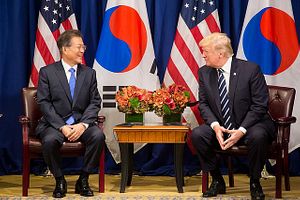When it comes to international trade there have been few bright spots for U.S. President Donald Trump. After his first year in office the U.S. trade deficit has continued to expand and talks to renegotiate “bad trade deals” such as NAFTA and bring manufacturing jobs back to the United States have largely stalled. In contrast, despite the rhetoric from Trump that the U.S.-South Korea free trade agreement (the KORUS FTA) is a “horrible” deal, U.S. trade with South Korea is one of the few bright spots for Trump after a year in office.
During Trump’s first year in office, the U.S. deficit in goods and services rose 12.1 percent to $566 billion. In contrast, the United States’ merchandise trade deficit with South Korea declined 17.3 percent to $22.9 billion as U.S. goods exports to South Korea reached an all-time high of $48.3 billion. The total U.S. trade deficit with South Korea should decline even further when full year country services trade data becomes available, since through the first three quarters of 2017 the overall U.S. trade deficit with South Korea was down 41 percent on strong services exports.
In context, the decline in the U.S. merchandise trade deficit with South Korea is significant. Among the United States’ ten largest goods trade deficits, only those with South Korea, Germany, India, and Malaysia declined in 2017 and only the deficits with South Korea and India fell by more than $1 billion.
The news on the jobs front is positive as well. Despite criticisms that the KORUS FTA has destroyed U.S. jobs, including suggestions by Trump that it has cost 200,000 jobs, the growth in U.S. merchandise exports and the decline in the U.S. goods trade deficit with South Korea means that trade with South Korea created U.S. jobs in 2017.
The debate over jobs and the KORUS FTA has long centered on the changes in the U.S. trade deficit. At the height of the U.S. trade deficit with South Korea in 2015, estimates by the Economic Policy Institute (EPI) suggested that the KORUS FTA may have cost the United States more than 95,000 jobs. These estimates were always incomplete as they did not account for jobs created by U.S. service exports and foreign direct investment (FDI) by South Korean firms. Since the implementation of the KORUS FTA, South Korean FDI has nearly doubled, creating more than 18,500 jobs. However, with U.S. exports to South Korea growing and the trade deficit declining, the United States most likely added more than 25,000 jobs in 2017, using EPI’s metric and the latest data on jobs supported by U.S. exports. All told, U.S. exports to South Korea support more than 360,000 jobs in the United States.
All of this makes the tense relationship over trade between the United States and South Korea more perplexing. After their first summit meeting, Trump announced that the United States and South Korea would be renegotiating the KORUS FTA, to the surprise of South Korean President Moon Jae-in. That was followed up by abortive attempt over the U.S. Labor Day weekend to begin the process of withdrawing the United States from the KORUS FTA. All of this came despite the fact that the trade deficit was declining even then.
The United States and South Korea have since agreed to amend the KORUS FTA and have had two initial rounds of discussions. The hope is to keep the talks short and focused on addressing U.S. concerns in the manufacturing sector, especially in automobiles where the United States faces a large structural deficit. If they are able to achieve that goal Trump will have two successes for his trade agenda — a successfully amended FTA and a declining trade deficit.
Troy Stangarone is the Senior Director for Congressional Affairs and Trade at the Korea Economic Institute of America. The views expressed here are the author’s alone.

































